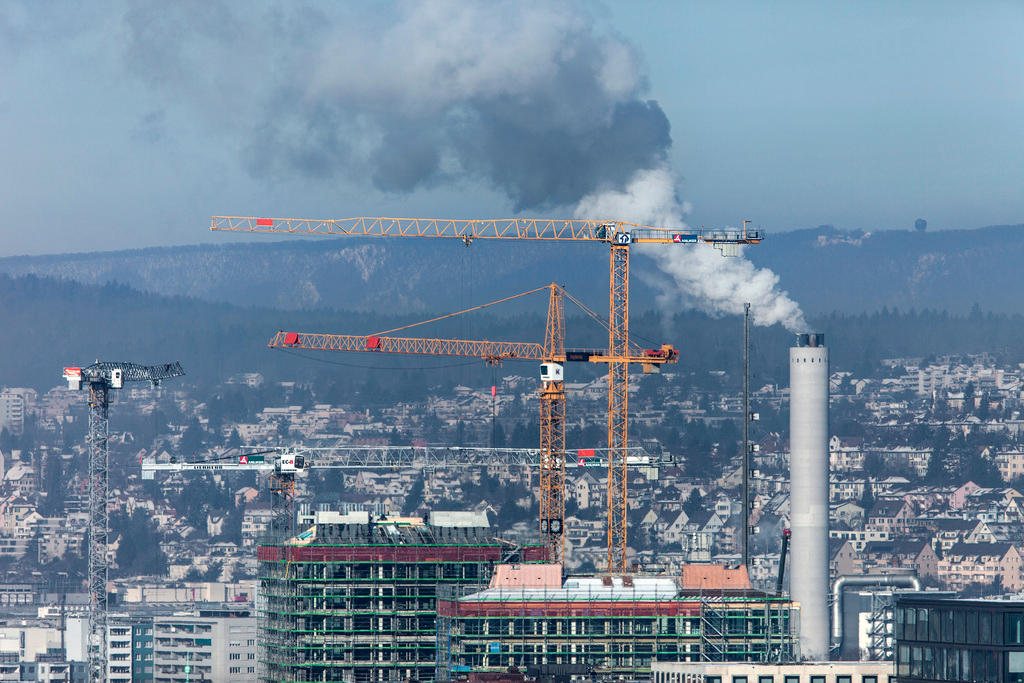Could Switzerland become part of a Paris Agreement exodus?

Following the US decision to pull out of the Paris climate agreement, Switzerland’s biggest political party has issued a similar demand. Could the Alpine state also withdraw from the global climate pact? Here’s what you need to know.
Within hours of taking office on January 20, US President Donald Trump signed an executive order to withdraw the US – the world’s second-biggest emitter – from the Paris Agreement for a second time, having previously done so during his first term. The withdrawal process takes one year.
Swiss People’s Party follows Trump on Paris accord
After Swiss voters overwhelmingly rejected an “environmental responsibility initiative” on February 9, the right-wing Swiss People’s Party issued a statementExternal link to celebrate the result and demand Switzerland also withdraw from the Paris Agreement.
In an interview with Swiss public television, RTSExternal link, party president Marcel Dettling explained that this was not a provocation and that the Swiss government could simply take the step on its own. “The Swiss government ratified this agreement without asking parliament or the Swiss people. The government can independently decide to withdraw from this agreement,” he said.
A spokesperson for the People’s Party confirmed to SWI swissinfo.ch that it plans to file a related motion in parliament.
Reacting to the news, Simone de Montmollin, a parliamentarian from the centre-right Radical-Liberal Party, told RTS: “We need to unite and stay firmly behind the Paris Agreement. It’s important for each of us [in Switzerland], but also for everyone on this planet. And we’re not going to call it into question.”
What’s the Swiss government’s position on withdrawing from the global climate accord?
Despite being a member of the People’s Party, Swiss Environment Minister Albert Rösti rejects his party’s demand.
“Swiss voters’ ‘no’ [on February 9] is certainly not a ‘no’ to protecting the environment,” he told reporters, adding that the Swiss had voted recently in favour of the Paris Agreement.
On June 2023, 60% of voters approved the new climate and innovation lawExternal link, which seeks to accelerate the country’s shift from fossil fuels to renewable energies and reach zero emissions by 2050.

More
Swiss approve net-zero climate law
“The population clearly passed the Climate and Innovation Act 2023. The population has thus committed itself to the Paris climate goals,” Rösti told Nau.chExternal link.
“I’m not saying my party is wrong,” Rösti also told RTS. “It’s a request that a party can make to parliament. But my duty as government minister is to implement popular decisions. And one of those decisions was decarbonisation.”
Would the Swiss legal and political system in theory allow Switzerland to withdraw from the Paris Agreement? If so, how?
Under Article 28External link of the Paris Agreement any party is free to withdraw from the accord three years after it has entered into force on its territory – for Switzerland this has been possible since October 7, 2020.
But Swiss legal experts reject Dettling’s statements and argue that the government cannot withdraw from the treaty on its own.
“The Paris Agreement was only ratified by the Federal Council in 2017 following parliamentary approvalExternal link earlier that year. Consequently, the Federal Council may not terminate this agreement on its own, but the Swiss federal parliament would have to authorise its termination. Mr Dettling is therefore mistaken in two respects,” Jörg Künzli, professor of constitutional and international law at the University of Bern, told SWI swissinfo.ch.

More
Swiss parliament approves global climate deal
The approval of the international climate pact was also subject to an optional (facultative) referendumExternal link, where Swiss citizens had the opportunity to challenge it over a 100-day period.
But this was not taken up, thus it was “implicitly approved by the Swiss people”, says the Federal Office for the Environment.
Regardless of whether the initiative to withdraw from the Paris Agreement comes from the government or parliament, a withdrawal would have to be “approved by parliament by means of a federal decree, which would also be subject to a referendum and therefore to the approval of the people”, explained environment office spokesperson Robin Poëll.

More
How Switzerland’s political system of direct democracy works
Are other countries planning to leave the Paris Agreement?
No other country has left the 2015 accord (194 states have joined plus the European Union). But Argentina’s government, under President Javier Milei, is reportedly exploring the proposal to follow the US in quitting the landmark agreement.
Senior officials are studying an internal memo recommending an exit, the Financial Times reported, after Argentina withdrew negotiators from last year’s COP29 climate summit and said it was re-evaluating its international commitments on the environment.
Indonesia, one of the world’s largest greenhouse gases emitters, has also reportedly cast doubt on the Paris Agreement. “If the US, which is currently the second-biggest polluter after China, refuses to comply with the international agreement, why should countries like Indonesia comply?” said Hashim Djojohadikusumo, Jakarta’s climate and energy envoy, at a conference in Jakarta in January.
Why did Trump leave the Paris Agreement?
The global climate pactExternal link is aimed at limiting long-term warming to 1.5°C above pre-industrial levels or, failing that, keeping temperatures at least well below 2°C above pre-industrial levels.
Trump’s order says the Paris accord is among a number of international agreements that don’t reflect US values and “steer American taxpayer dollars to countries that do not require, or merit, financial assistance in the interests of the American people”.
Instead of joining a global agreement, “the United States’ successful track record of advancing both economic and environmental objectives should be a model for other countries”, Trump said.
Following the US move, UN climate chief Simon Stiell insisted that the shift to clean energy was the “economic growth deal of the decade”. “The door remains open to the Paris agreement, and we welcome constructive engagement from any and all countries,” he said.
Stiell says in the ten years since the Paris Agreement was adopted the world has become more divided, but the climate negotiation process has “managed to buck the trend”.

More
Switzerland’s new 2035 climate goals disappoint
Edited by Reto Gysi von Wartburg/ts

More
Newsletters

In compliance with the JTI standards
More: SWI swissinfo.ch certified by the Journalism Trust Initiative









You can find an overview of ongoing debates with our journalists here . Please join us!
If you want to start a conversation about a topic raised in this article or want to report factual errors, email us at english@swissinfo.ch.